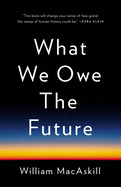
To peer one million years into the future might sound like terrible advice to anyone attempting a "live in the moment" mantra. Eternity is slow and humans frenetic; time is vast and humans small. Why worry what tomorrow will bring when today has enough trouble of its own? But Oxford philosopher William MacAskill (Doing Good Better) makes a stirring--and oddly soothing--case for forward-thinking in his new work of nonfiction, What We Owe the Future. He calls for "longtermism," the belief that "positively influencing the long-term future is a key moral priority of our time." What We Owe the Future, in five parts, attempts to convince readers why this belief should become their own.
The result is a hopeful but grounded work of philosophy, both rigorous in its research and expansive in its subject matter, tackling civil rights as readily as technology and climate change. As MacAskill explains (in the interview below), his argument hinges on the anticipation that "we may be approaching a critical juncture in human history that determines whether future generations live lives of flourishing or misery--or never live at all." But what is most miraculous about MacAskill's book is not this urgency or the manner in which it's communicated, but rather how well MacAskill convinces readers that it matters at all.
In theory, readers should find caring about the future to be a rational task. After all, their children--or their friends' and family's children--are the future. But the further existence pans out from the present, the more impossible it becomes to connect, intimately, with future generations. How can readers care about someone whose life they cannot possibly imagine?
Well, as What We Owe the Future argues, this is a basic principle of empathy: the ability to care about those with whom we do not share identity, experience or--in this case--time. And it is absolutely vital to the survival of the planet and its people. "Distance in time is like distance in space," MacAskill writes. "People matter even if they live thousands of miles away. Likewise, they matter even if they live thousands of years hence." If readers want their descendants to flourish, they must start caring about them now. This truth gives What We Owe the Future the weight of prophecy.
Throughout the book, MacAskill uses clever illustrations to condense an otherwise enormous topic into digestible pieces. For instance, he harnesses the idea of an "imprudent teenager" to describe humanity's frequent disregard for the long game. But then he turns the analogy on its head, writing, "A teenager knows approximately how long she can expect to live. But we do not know humanity's life expectancy. We are more like a teenager who, for all she knows, might accidentally cause her own death in the next few months but also might live for a thousand years. If you were in such a situation, would you think seriously about the long life that might be ahead of you, or would you ignore it?" Chances are, most readers would--at the very least--take pause.
That pause is where MacAskill thrives. There are certainly moments when What We Owe the Future, like many works of philosophy before it, can boggle due to the immense bulk of the knowledge it aims to impart. But there are many more moments when the book is as clear as an epiphany. When it most often succeeds in grabbing attention, the book is exciting, even thrilling, and generates enormous fodder for both reflection and action.
This moral call to action is well and good, but it's only made real through What We Owe the Future's humble belief that the future could be worth fighting for. The future might be a good place! Maybe not great--MacAskill points out that the word "utopia" etymologically means "no-place"--but good. Most readers who pick up this book will have consumed enough doomsday news to feel as though the Earth is headed toward an inevitable crash-and-burn. And MacAskill concedes this is possible. But he also calls out dozens of powerful examples in history where circumstances have improved, largely through human intervention, discovery and hope. Circumstances changed because humans believed they could. Why should now be any different? A lot can change in a million years.
As the shelves of books about climate change, social justice and public health become increasingly overloaded, some might think they all have the same message: "Buckle up. Things have gotten bad, and they're about to get worse." In many cases, this is true. But many such books--MacAskill's very much included--do not end on a note of cynicism. They argue that life is long, and time even longer. We have time to make lasting change, but every second is precious. To give the future what it's owed, we all must consider the present--and how its ripple effect will remain long after we are gone. --Lauren Puckett

